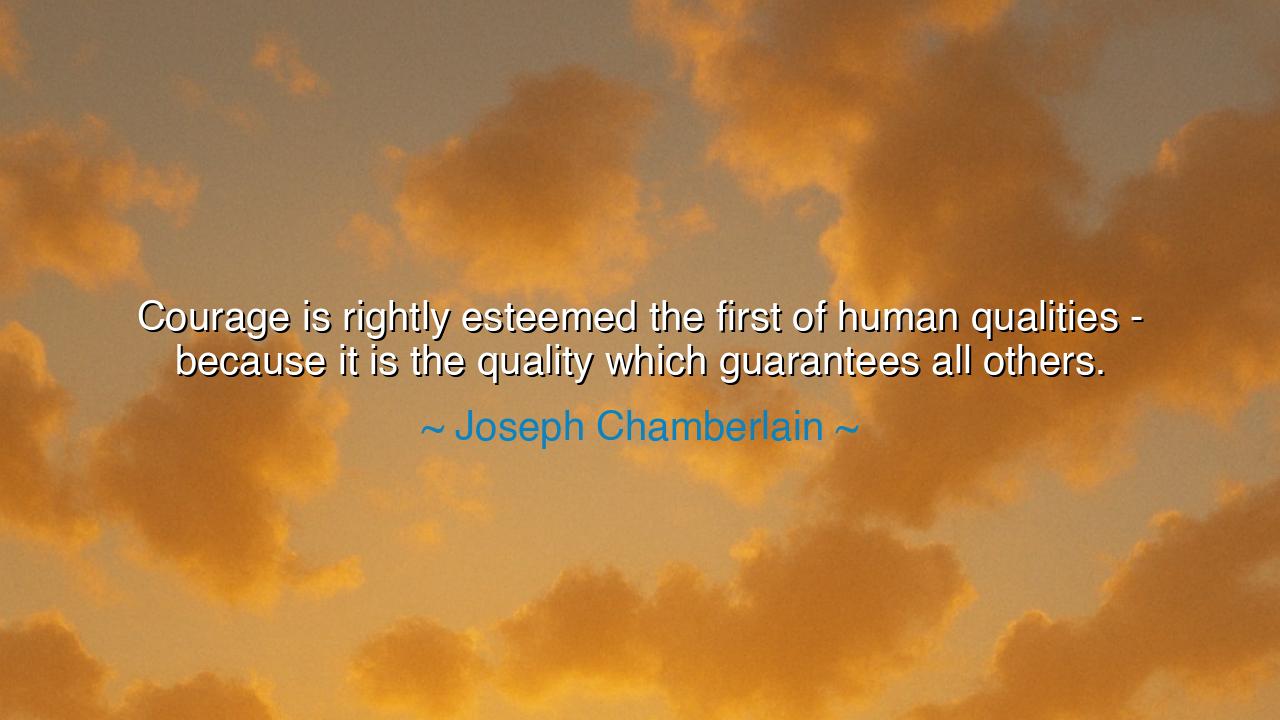
Courage is rightly esteemed the first of human qualities -
Courage is rightly esteemed the first of human qualities - because it is the quality which guarantees all others.






The words of Joseph Chamberlain — “Courage is rightly esteemed the first of human qualities — because it is the quality which guarantees all others.” — resound like a call to the soul, echoing through the long corridors of human history. In this brief yet mighty saying, Chamberlain unveils a truth known to every age of heroes and philosophers alike: that courage is not merely one virtue among many, but the foundation upon which all other virtues stand. For without courage, goodness falters, truth is silenced, and justice remains a dream. It is the flame that gives life to the spirit of man — the power that enables all other powers to be.
Chamberlain, a statesman of great ambition and conviction in 19th-century England, spoke these words not from the safety of theory but from the crucible of leadership. He lived in a time of change, when the world demanded both vision and fortitude. He understood that honor, integrity, compassion, and wisdom — though noble — are fragile when fear rules the heart. Only courage can sustain them. The honest man requires courage to speak truth in the face of deceit; the kind man requires courage to show mercy where cruelty reigns; the just man requires courage to uphold what is right when it costs him dearly. Thus, Chamberlain called courage the first of human qualities because it is the guardian of all the rest.
The ancients knew this truth well. Aristotle, writing two thousand years before Chamberlain, declared that courage is the virtue that makes all others possible. The philosopher saw that no one can be virtuous without first conquering fear — for fear is the great enemy of the soul. It tempts us to remain silent when we should speak, passive when we should act, and selfish when we should serve. To be wise without courage is to be clever yet cowardly; to be kind without courage is to be tender yet weak. Only the one who possesses courage can make his virtues living realities instead of noble intentions.
Consider the story of Harriet Tubman, the woman who escaped slavery and then returned, again and again, to lead others to freedom through the perilous paths of the Underground Railroad. Each journey was shadowed by death, yet she pressed on. Her compassion was mighty, her sense of justice unwavering — but it was her courage that gave them wings. Without that courage, her goodness might have remained a quiet dream. With it, her life became a testament to the triumph of spirit over fear. She proved, as Chamberlain did, that courage guarantees all other virtues; it transforms faith into action, conviction into reality, and love into sacrifice.
Courage, however, is not only found in the thunder of history or the clash of destiny. It lives in the quiet choices of every day. The parent who rises to face hardship for the sake of their children, the worker who refuses dishonor for the sake of integrity, the student who dares to be different — each of these is a hero in the hidden battlefields of the heart. For courage is not the absence of fear, but the mastery of it. It is the calm voice that says, “I will go on,” even when the heart trembles. And it is this courage — unseen by crowds, unnoticed by fame — that preserves the moral strength of the world.
But why is courage so rare, if it is so essential? Because it demands the surrender of comfort. To be courageous is to step beyond safety into the realm of the unknown. It asks us to endure failure, ridicule, and loss for the sake of something greater than ourselves. The coward seeks peace through avoidance; the brave find peace through endurance. The one who possesses courage does not wait for perfect conditions — he acts, knowing that uncertainty is the crucible where virtue is refined.
Let this teaching, then, be carved upon your heart: courage is not only the first of virtues, but the guardian of the soul. Without it, wisdom is hollow, compassion timid, and faith barren. With it, even the humblest life becomes noble. Therefore, cultivate courage daily — not through reckless defiance, but through steadfast faith. Speak the truth even when it costs you comfort. Stand firm when the world urges you to kneel. Love deeply, though it may bring pain. Act justly, though no one stands beside you.
For in the end, as Chamberlain and the ancients alike remind us, it is courage that lifts humanity above its fears and allows the divine spark within us to shine. Every age has need of the brave — those who dare to live in truth, who guard the virtues of the soul against the encroachment of fear. Be one of them. For the one who possesses courage does not merely survive the world — he redeems it.






AAdministratorAdministrator
Welcome, honored guests. Please leave a comment, we will respond soon